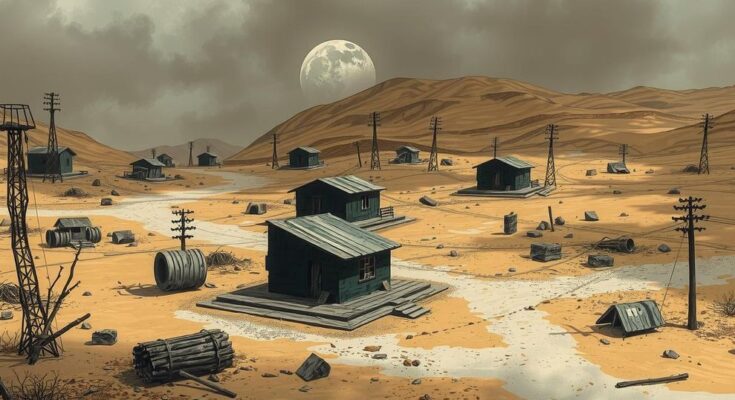The ongoing conflict in the Democratic Republic of the Congo (DRC) involves M23 rebels advancing towards Kinshasa, amid the presence of Rwandan and Ugandan troops. The violent past of the DRC continues to echo, with communities suffering from destruction and displacement. Analysts express concern that this situation may escalate into a broader regional war. The DRC faces enduring challenges including political instability and resource exploitation, necessitating urgent dialogue and intervention.
The current conflict in the Democratic Republic of the Congo (DRC) has reignited haunting memories of past wars as M23 rebels advance toward Kinshasa. Following their seizure of Goma and Bukavu, communities are experiencing violence or attempting to flee. The UN has identified Rwandan backing for M23, despite DRC’s $5 million reward for capturing its leaders proving ineffective.
As M23 continues its offensive in North and South Kivu, Ugandan troops are also increasing their presence in the Ituri province, purportedly in combat against the Allied Democratic Forces and CODECO. The resurgence of foreign military forces parallels previous conflicts in the region, raising concerns over the risk of a broader war.
Political analysts note that the growing military involvement from Rwanda and Uganda resembles the Second Congo War, with both nations playing pivotal roles in the 1998 “Great Africa War.” This past conflict drastically reshaped the region, leading to millions of deaths and a proliferation of armed groups, including M23.
Over the past three decades, the DRC has endured persistent violence leading to over six million fatalities and numerous displacements. Factors contributing to this turmoil include historical grievances, resource competition, and corruption within the Congolese government. The DRC has been a battleground since foreign incursions began, driven by Rwanda’s quest against Hutu militias within its borders.
Reports from the UN have outlined how these conflicts resulted in numerous human rights violations and extensive looting of resources. The consequences persist today, as the DRC remains entangled in layers of conflict and exploitation, complicated further by international dynamics and entrenched issues.
Recent analyses highlight that both Rwanda and Uganda have maintained a continuous presence in the DRC, despite perceptions of an entry and exit. Current developments reveal contradictory military operations with Rwanda supporting M23 and Uganda engaged alongside DRC forces, all while regional powers actively pursue peace negotiations.
Amid these complexities, the DRC’s valuable mineral resources are a focal point of conflict, with M23 reportedly financing operations through illegal gold sales. The situation necessitates comprehensive diplomatic efforts to resolve internal struggles and legitimate governance challenges faced by the DRC’s leadership.
Calls for national dialogue and support from the International Criminal Court to address human rights violations signify steps in the right direction. Analysts assert that a resolution requires thoughtful engagement with both Congolese citizens and broader regional involvement, signifying a need for the DRC to find a path to stability for both itself and the continent.
In summary, the ongoing conflict in the DRC evokes memories of past wars and emphasizes the need for urgent international attention. The involvement of foreign troops from Rwanda and Uganda raises alarms about the potential for regional conflict. To resolve the situation, a larger diplomatic initiative is needed, focusing on stabilizing the DRC internally while addressing the humanitarian crises resulting from decades of violence and exploitation. Clearly, the Congolese people deserve peace to rebuild their nation and contribute positively to the continent.
Original Source: www.aljazeera.com




